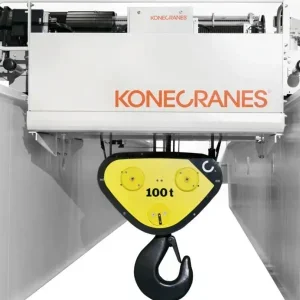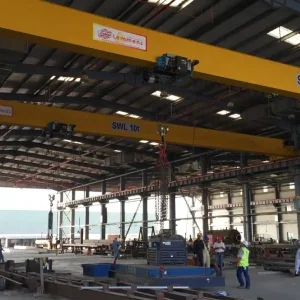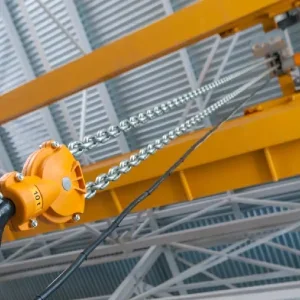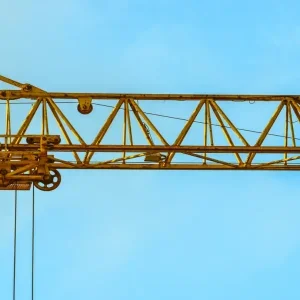Modern gantry and travelling cranes have features that crane owners didn’t even dream about 10 years ago. Technical innovations like high torque and high speed winches and frequency converters for ultra comfortable operation are becoming increasingly common. The one feature they don’t have, however, is the one thing that crane owners have been dreaming about for ever – the crane that needs no servicing.
Klaus Vetter, chief executive of jib crane manufacturer Vetter Fordertechnik, based in Siegen in the very heart of Germany, found a quite surprising solution three years ago. He got together with 18 competitors (today 25), both crane manufacturers and crane service companies, and founded the Gütegemeinschaft Kranservice e. V. – a non-profit organisation that pools experience and knowledge about all kinds of hoists, jib cranes and overhead cranes. The name translates as something like Quality Crane Service Cooperative. What today sounds like a fairy tale, competitors gathering around the famous round table to meet and discuss a kind of co-operation, has proved to be successful. Klaus Vetter does not know exactly how many cranes GKS has under service contract but there are estimates that put it at more than 10, 000.
Crane checking regulations in Germany are quite strict and someone has to care for the crane/hoist at least once a year. The German regulations BGV D8/BGV D6 and BGG 905 state that every crane lifting more then one tonne must be inspected by a Kransachverständiger – a skilled and trained engineer who knows about cranes.
Vetter, Demag, Kuli, Kone, Stahl and many more manufacturers as well as larger service companies like D-Krantechnik have been working together for the last three years to set up homogeneous standards for crane service. GKS is based in Vetter’s home town of Siegen, but that “is just a coincidence” says Klaus Vetter. It is not based on Vetter’s premises and does not share any personnel. It is a completely separate organisation with four full-time employees under the leadership of Dipl.-Ing. Volker Goergen.
The prime goal was to establish an alliance against the so called “black sheep” in the crane inspection business that seek to undercut every price offered by the crane manufacturers and in many cases offer bad service and have little knowledge, which has led to some serious accidents.
“This had to be changed,” Vetter says, “because the operator needs safe and reliable lifting equipment. Before we founded GKS most of our colleagues – just like us – delivered the crane, did the first inspection and didn’t see the crane for a long time. If there was an accident or a major failure, someone from the operator’s staff called to tell us that our crane was a miserable piece of equipment”.
Seeking change, Vetter and his competitors found a solid base to pool the knowledge and experience of all manufacturers and service companies.
In the beginning this was not straightforward because there was resentment and suspicion on all sides. Every GKS member has to supply all relevant information about the construction, spare parts and service requirements for every type of hoist, motor and crane.
“That wasn’t so easy at the beginning”, says Vetter, “but every participant had to learn – if I am opening the box of company knowledge I will get more of that back. Because we can only survive if everybody knows everything regarding crane service.” GKS calls on a large pool of about 1,000 service technicians, but it does not directly employ them. Instead they are employed by a GKS member company. Most GKS technicians are employed by Demag, Stahl or Konecranes because these three companies have the strongest German-wide service organisations. The servicemen are certified crane technicians who earn their money from either a crane manufacturer or an independent servicing company. They may be working for their real employer – Demag, for example – in the morning – and then representing GKS in the afternoon.
Typically, a crane owner who has many cranes from one supplier is likely to stick with the service offered by that manufacturer. The customer likely to be attracted to the services of GKS is either someone who owns various brands of crane and hoists, or who perhaps has just a single crane.
Training was required to make the technicians realise that when they were on a GKS job they were neutral and independent of any manufacturer. At the outset there was a natural tendency for a GKS service technician employed by Konecranes, for example (or Demag, or whomever), to do a better job on the Kone hoist encountered on customer visits and to be less enthusiastic perhaps with other brands. This type of behaviour has been eliminated, Vetter says, and the GKS technicians are working on a totally neutral base. They are trained to look at the crane and not the name plate. They are not responsible for crane sales; they just make the machines run. The crane owner signs a service contract not for a particular manufacturer but for the service and the safety of his lifting equipment.
To check the work of the GKS service teams two retired crane engineers travel throughout the country without prior announcement. Klaus Vetter adds: “It is always a tricky thing because every member company has the obligation to fulfil our rules and to meet our standards. These standards have been certified by the RAL organisation, which looks for uniform technical guidelines, a strict quality management. All members are reaudited every three years. In addition to this, every year a fifth of all members is randomly selected (drawn by lots) for auditing, so nobody knows exactly when the next check will occur.” By establishing GKS, what the German crane industry has effectively done is to create a new profession of approved crane service technician.
Every GKS service technician has undergone the same training. They attend seminars once or twice a year and know how to inspect a crane, how to check critical features and how to order the needed spare parts. It really can happen that a service technician from Demag is called by a GKS customer who operates 10 SWF hoists. GKS’s goal is to provide service regardless if it is a Demag, a Stahl, a Vetter or any other crane.
The only major crane manufacturer that has not joined the organisation is Abus, which in many respects travels its own path in this industry.
What’s next on the schedule? The second big step is to establish the Kranservice-Techniker with a stand alone job description being set down according to rules and content defined by the GKS. The education will be held by the independent TÜV certification organisation at an neutral venue in the Siegerland area rather than in the premises of a GKS member company.
“This new profession is something the branch definitely needs because mechanical parts, safety regulations, electrics and electronics are so very important when it comes to modern lifting equipment that we need a real crane specialist to carry out service, maintenance and expert opinion in case a crane should undergo severe refurbishment,” Vetter says.
If the inspection of lifting equipment in Germany is organised in such a smart an strict way, the question arises: why not extend these services to neighbouring countries like Switzerland, Austria or Benelux? “That’s not so easy,” Vetter says, “because every country sticks to its own laws, regulations and technical specialities. So GKS at the moment is not planning to extend its services abroad. But we are willing to support other foreign organisations in setting up something comparable to the GKS.”






